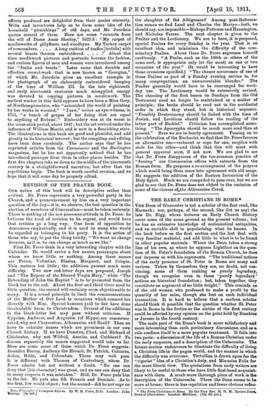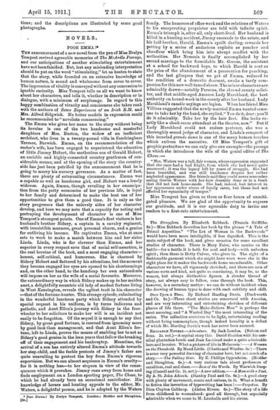THE EARLY CHRISTIANS IN ROME.*
THE Dean of Gloucester is not a scholar of the first rank, like Han:tack ; nor, perhaps, of the second, like (let us say) the late Dr. Bigg, whose lectures on Early Church History cover some of the same ground as the present volume ; but he has an extensive knowledge of ecclesiastical antiquities, and an enviable skill in popularising what he knows. In the book before us the first section and the last deal with very familiar material, and add little to what is to be found in other popular manuals. Where the Dean takes a strong line of his own, as where he opposes Lightfoot on the ques- tion of St. Peter's foundation of the Roman Church, he does not impress us with his arguments. " The traditional notices of the early presence of St. Peter in Rome are many and various. Taken by themselves they are, no doubt, not con- vincing, some of them ranking as purely legendary, though we recognise even in these 'purely legendary' notices an historical foundation ; but, taken together, they constitute an argument of no little weight." This reminds us of the old woman who professed to make a profit by the quantity of her sales, though she lost on each individual transaction. It is bard to believe that a modern scholar should think it possible that the question whether St. Peter was in Rome in the forties or the sixties of the first century could be affected by any opinion on the point held by Eusebins or Jerome in the fourth century.
The main part of the Dean's book is more satisfactory and more interesting than such preliminary discussions, and as a rule confines itself to a more popular treatment. It falls into two parts : a discussion of the life of a Roman Christian under the early emperors, and a description of the Catacombs. The former section endeavours to illustrate the difficulty of living a Christian life in the pagan world, and the manner in which the difficulty was overcome. Tertullian is drawn upon for the " rigorist " idea of a Christian's duty, and Minucius Felix for the more liberal view. The quotations from early writers are likely to be useful to those who have little first-hand acquaint. ance with them. A much more thorough piece of work is the description of the Catacombs. There the Dean seems to be more at home; there is less repetition and fewer obvious reflee- • The Early Christians IM Rome. By the Very Rev. H. D. M. Spence-Jones. Dean of Gloucester. London: Methuen. [12s. 6d. net.]
Eons; and the descriptions are illustrated by some good photographs.





































 Previous page
Previous page